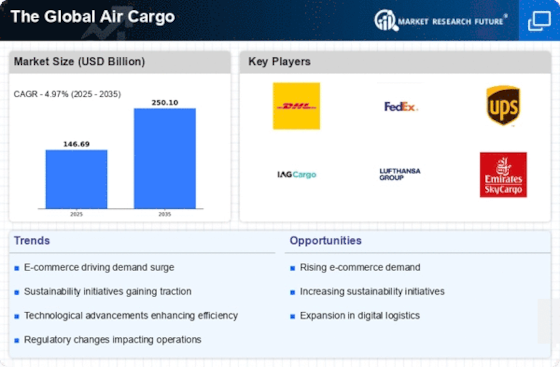Top Industry Leaders in the Air Cargo Market

The air cargo market, a vital artery of global trade, exhibits a dynamic and ever-evolving landscape. With a projected growth of 4.9% over the next five years, it attracts a diverse range of players vying for market share
Strategies for Success:
In this dynamic environment, success hinges on several key strategies:
- Network Optimization: Airlines are expanding and optimizing their networks, adding freighter capacity and strategically placing hubs to cater to specific trade lanes. For instance, Emirates SkyCargo recently launched a new freighter service between Dubai and Istanbul.
- Digitalization: Embracing technology is crucial. Airlines are investing in e-commerce platforms, real-time tracking systems, and data analytics to improve efficiency, transparency, and customer experience.
- Partnerships and Alliances: Collaboration is key. Airlines are forming partnerships with other carriers, airports, and logistics providers to offer seamless multimodal solutions and expand reach.
- Product Specialization: Focusing on specific segments like express, cold chain, or pharmaceuticals can create a competitive edge. Etihad Cargo, for example, has built a strong reputation in transporting perishables.
- Sustainability: Reducing carbon emissions is a growing concern. Airlines are investing in fuel-efficient aircraft, exploring sustainable aviation fuels (SAF), and optimizing routes to minimize environmental impact.
Factors Influencing Market Share:
Several factors influence market share in the air cargo market:
- Price: Airlines compete on price, offering discounts and flexible solutions. However, maintaining profitability amidst rising fuel costs and operational expenses is a balancing act.
- Capacity: Access to freighter capacity is critical, especially during peak seasons. Airlines and integrators with diversified fleets and strategic partnerships have an advantage.
- Service Quality: Reliability, speed, and efficient handling are crucial. Airlines with advanced tracking systems, streamlined processes, and value-added services attract customers.
- Network Connectivity: Extensive networks covering major trade lanes and offering efficient connections are key for global reach.
- Customer Focus: Understanding customer needs and offering customized solutions is essential. Airlines that invest in building strong relationships and providing personalized services gain loyalty.
Industry News and Market Summary:
July 2023: The air cargo industry experienced a 20.7% month-on-month increase in cargo tonne kilometers (CTKs), indicating recovery after the initial pandemic shock. However, compared to pre-pandemic levels, CTKs remain slightly lower.
August 2023: IATA revised its 2023 air cargo growth forecast downwards to 2%, citing economic headwinds and geopolitical tensions.
September 2023: Airlines continued to invest in freighter capacity, with orders for over 100 new freighters placed in the first nine months of the year.
October 2023: Concerns emerged over the impact of rising fuel prices on air cargo profitability. Airlines explored cost-cutting measures and fuel hedging strategies.
The most prominent major key players in the air cargo companies globally are mentioned below:
-
Qatar Airways (Qatar)
-
Etihad Airways (UAE)
-
International Consolidated Airlines Group, SA (UK)
-
All Nippon Airways Co., Ltd (Japan)
-
Deutsche Lufthansa AG (Germany)
-
Japan Airlines (Japan)
-
The Emirates Group (UAE)
-
Singapore Airlines (Singapore)
-
Cargolux (Luxembourg)
-
Korean Air (South Korea)
-
China Eastern Airlines Corporation Limited (China)
-
Cathay Pacific Airways Limited (Hong Kong)
-
DHL International GmbH (Germany)
-
United Parcel Service of America, Inc. (US)
-
FedEx (US)










